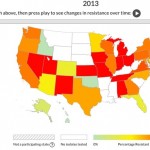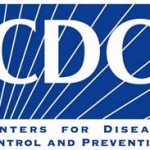The U.S. Department of Health and Human Services announced on Thursday, May 26, 2016 that E. coli resistant to the critical antibiotic colistin was found in a person in this country for the first time. In addition, colistin resistance was also found in a sample taken from a pig intestine that was analyzed by the USDA. The E. coli bacteria that was found in the pig was also resistant to ampicillin, streptomycin, sulfisoxazole, and tetracycline. This is the scenario that food safety experts and doctors have been dreading for some time. Colistin is a last-resort drug that is used to treat patients who have multi-drug resistant infections. The bacteria has also been found in Europe and Canada. The patient with the resistant E. coli bacteria was treated in an outpatient military … [Read more...]
Soy May Be Natural Antimicrobial Agent
Research conducted by Professor Suresh Neethirajan at the University of Guelph in Canada has shown that soy isoflavones and peptides may inhibit the growth of pathogenic microbes that cause food poisoning. The study, published in Biochemistry and Biophysics Reports for the July 2016 issue, tested soy peptides against bacterial biofilms for antimicrobial activity. The researchers found that the soy peptides had an inhibitory effect on Listeria monocytogenes. Another peptide was effective against Pseudomonas aeruginosa and Listeria monocytogenes. This could make these compounds an alternative to antimicrobials and antibiotics currently used. Pathogenic bacteria can develop biofilms in different conditions, which enable them to emerge as resistant strains. There is always a need to … [Read more...]
CDC: Pork Salmonella Outbreak Was One of Washington’s Largest
A 2015 Salmonella outbreak linked to whole roasted pork was one of the largest in Washington state's history, according to a new report from the Centers for Disease Control and Prevention (CDC). The outbreak sickened 184 people in Washington, one person on Alaska, two people in California, two people in Idaho and three people in Oregon. The outbreak was linked to meat from rom Kapowsin Meats of Graham, Wash. There were two outbreak strains -both antibiotic resistant, Salmonella I 4,[5],12:i:- and Salmonella Infantis. Thirty people were hospitalized. Most of those who became ill reported attending events where whole pigs were roasted before they became symptomatic. Salmonella causes symptoms including nausea, vomiting, abdominal cramps, diarrhea, bloody diarrhea and fever which … [Read more...]
Largest Multistate Food Poisoning Outbreaks 2015: #3 Pork
A Salmonella outbreak linked to pork from Kapowsin Meats of Graham, Wash. was the third-largest multistate food poisoning outbreak of 2015. The outbreak, which sickened 192 people in five states from April 25, 2015 to October 10, 2015, was announced by the Centers for Disease Control and Prevention (CDC) in August. The antibiotic resistant outbreak strains of Salmonella I 4,[5],12:i:- and Salmonella Infantis hospitalized 30 people. Most of the illnesses occurred in Washington. By state, the case count was as follows: Alaska (1), California (2), Idaho (2), Oregon (3) and Washington (184). Most of those sickened reported attending events where whole pigs were roasted before they became ill. Salmonella symptoms include nausea, vomiting, abdominal cramps, diarrhea, bloody diarrhea and … [Read more...]
University of MN Identifies New Strain of Antibiotic Resistant Bacteria
Dr. Tim Johnson of the University of Minnesota has identified a new strain of antibiotic resistant bacteria. This bacteria, known as Enterobacter cloacae, was reported in a hospital outbreak in Fargo, North Dakota. Whole genome sequencing revealed that 32 of the strains collected from patients in the Upper Midwest were clonal. The bacteria is spreading throughout this region of the country. Dr. Johnson said, "this provides evidence for the origin of this multidrug resistant clone in the Fargo-Moorhead area, followed by its spread over time through nursing homes and hospitals in western Minnesota, and more recently in the Twin Cities metro area." He added, "this is a public health crisis. This is probably the biggest challenge we're going to face from a public health standpoint in our … [Read more...]
Antibiotic Use in Agriculture Continues to Increase
A new report from the FDA finds that antibiotic use in agriculture is continuing to increase, despite new guidelines from the government. Sales of medically important antibiotics in food-producing animals increased by 3% between 2013 and 2014. Sales one of drug that is critically important to human health, cephalosporins, increased by 12% from 2013 to 2014 despite the government restricting their use in 2012. The report states that domestic sales and distribution of antimicrobials approved for use in food-producing animals increased by 22% from 2009 through 2014. In 2014, medically important antimicrobials accounted for 62% of all domestic sales of all antimicrobials. Tetracycline sales are the largest volume of antibiotics used in food animals. Food & Water Watch says that … [Read more...]
Salmonella Outbreak Linked to Kapowsin Pork Ends with 192 Sick
After sickening 192 people in five states, a Salmonella outbreak linked to pork from Kapowsin Meats of Graham, Wash. has ended. The antibiotic resistant outbreak strains of Salmonella I 4,[5],12:i:- and Salmonella Infantis hospitalized 30 people, according to the Centers for Disease Control and Prevention (CDC). Most of the illnesses occurred in Washington. By state, the case count was as follows: Alaska (1), California (2), Idaho (2), Oregon (3) and Washington (184). Most of those who became ill reported attending events where whole pigs were roasted before they became symptomatic. Salmonella causes symptoms including nausea, vomiting, abdominal cramps, diarrhea, bloody diarrhea and fever which usually develop within six to 72 hours of exposure and last up to a week. Those sickened … [Read more...]
California Sets Strictest Antibiotic Standards for Factory Farm Use
California has just passed a law setting the strictest standards for antibiotic use in farm animals in the country. Senate Bill 27, which was enrolled September 26, 2015, prohibits the administration of "medically important antimicrobial drugs, as defined, to livestock unless ordered by a licensed veterinarian through a prescription or veterinary feed directive." The bill prohibits using antibiotics solely for purposes of gaining weight or improving feed efficiency. The governor's signing statement states "SB 27 addresses an urgent public health program. The science is clear that the overuse of antibiotics in livestock has contributed to the spread of antibiotic resistance and the undermining of decades of life-saving advances in medicine." The FDA set voluntary standards last year … [Read more...]
NARMS Now Interactive Tool Launched by CDC
NARMS Now, which is part of the National Strategy for Combating Antibiotic-Resistant Bacteria (CARB) and the President's Open Government Initiative has been released to the public. NARMS reports present aggregated data, but this new system is the entire collection of the government's enteric bacterial isolates collected over the past 18 years. The data includes information for Salmonella, Campylobacter, E. coli, and Enterococcus. It allows data sharing for those who want to download and analyze microbiological data. It will be incorporated into interactive displays to let readers visualize findings across sample sources. The new tool makes it quicker and easier to see how antibiotic resistance for four bacteria spread through food. Every year in the U.S., antibiotic-resistant … [Read more...]
Antibiotic Resistant Bacteria Sickens 2 Million Americans Each Year
Antibiotic resistant bacteria sickens 2 million Americans each year, according to a new report from the Centers for Disease Control and Prevention (CDC). These infections contribute to more illness complications, higher health care costs and more intense treatments. The estimated cost of these illnesses is $20 billion annually in excess direct health care costs, with an additional $35 billion in lost productivity. One of the biggest drivers of this problem is inappropriate antibiotic prescribing by doctors, which can lead to adverse reactions. About 142,000 adult emergency department visits each year stem from adverse drug reactions from antibiotics, most of which are caused by allergies. The report states that doctors inappropriately prescribe antibiotics for acute respiratory tract … [Read more...]













